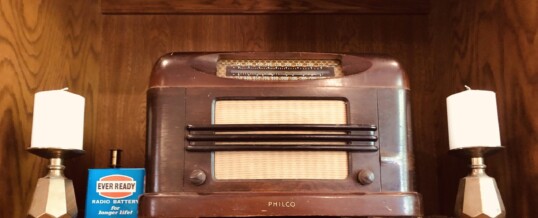
About 40 years ago, my dad gave me a radio. Not just any radio. It was what’s called a farm radio.
According to Texas Co-op Power Magazine, in 1936, just three out of 100 farms had electricity. By the mid-1940’s, it was three out of 10. That still left most farm families without power.
The Philco radio my dad gave me was made around 1946 and it ran off a dry cell battery.
A dry cell battery radio was how those with no electricity listened to news, Fibber McGee and Molly, Little Orphan Annie, and The Lone Ranger.
As a kid on Beech Street in Ashdown, Arkansas, I listened to the radio. A lot.
I was impressed that I could hear people talking who were in cities far away.
My father and grandfathers are likely the reasons I became a complete and total radio addict.
If my dad’s car was running, the radio was on. If my dad’s dad was working in his blacksmith shop, the radio was on. If my mom’s dad was working in his office, the radio was on.
I didn’t know any other way to live. So, when I played in my room, I had my radio on.
The major difference between them and me was what came out of the speaker. Dad liked 50’s music, his dad liked country/western, and my mom’s dad listened to the news on shortwave.
Me? I loved 60’s and 70’s Top 40. Still do.
By age eight, I had a sense that working in radio was something I wanted to do. By 16, I was doing it.
But this story isn’t about that. It’s about the actual radios I was around, listened to, and owned. One radio in particular. That 1946 Philco my dad found at an estate sale and proudly gave to me.
After I left home, my dad called one day to tell me that he had something for me. He stopped by my place and walked in with that old Philco tabletop radio.
The funny thing about a hobby is that once you start down the path of anything in particular, people love to bring you something associated with it.
In my case, that meant people brought me radios. Lots of radios.
Some were nice, some were old, and many didn’t work. I think conversations went something like:
Broken Radio Owner #1: “What do we do with it now that it has quit working?”
Broken Radio Owner #2: “We paid a lot of money for it, so I hate to throw it in the trash.”
Broken Radio Owner #1: “What about that Moore kid? He likes radios.”
Broken Radio Owner #2: “Yeah, let’s give it to him.”
I’m sure that this thrilled my mom to no end.
But, to her credit, as long as I kept my room neat and organized, she never said a word.
But since I’d left home when dad gave me the Philco, it wasn’t my mom’s concern; it was my wife’s. By this point I had amassed a large number of radios in my collection. Most of them didn’t work.
Including the Philco. And I was told by many it likely never would.
An engineer friend of mine looked at it and said that the battery it had to have to work was no longer being made. Also, most of the tubes and other parts would be hard if not impossible to find.
Just forget it and admire it, was what he suggested I do.
So, for three and half decades, that’s what I did. I even donated it to a museum collection.
But during a visit to the museum, I lamented to the tour guide that I’d given it to them. I gave it away when my dad was still living. He had since passed.
She gave it back to me.
I called another engineer. He said the technology now existed to power the unit and the Internet made it possible to find parts and tubes.
So that’s what we did. I bought the parts, and he fixed it. And on a Saturday, I brought it home, turned it on, and the radio came back to life for the first time in 70 years.
It picked up voices from the same far away cities I’d listened to as a kid. I tuned in the news, country music, and oldies.
It was a special moment. My mom was here to share it. I just wish my dad could have been.
©2024 John Moore
John’s books, Puns for Groan People and Write of Passage: A Southerner’s View of Then and Now Vol. 1 and Vol. 2, are available on his website TheCountryWriter.com, where you can also send him a message.
JUL
2024
